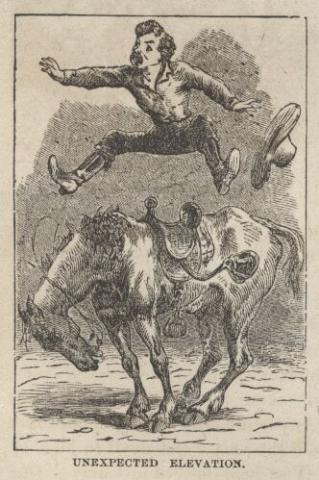Samuel Langhorne Clemens had been a riverboat pilot from February of 1857 to May of 1861, primarily navigating the Lower Mississippi River from New Orleans to St. Louis. James Buchanan was president. Abraham Lincoln was inaugurated in March of 1861; Sam was renewing his pilots license; the Civil War broke out. By the end of April, Sam's career on the river was over. Lincoln appointed Orion Clemens, Sam's older brother, secretary of the new territorial government of Nevada. Three months after leaving the river Sam was on his way to Nevada on the Overland Stage from St. Joseph, Missouri to Carson City.
Leonard writes: When the Whig Party, along with a branch of the Know-Nothings and some antislavery Democrats, resolved into the antislavery Republican Party in 1854, Sam didn’t follow immediately, but kept a neutral stance evidently oriented toward the status quo —a situation congenial to his career as a steamboat pilot, which depended upon both North and South to make the river-based operations workable.
In 1860, Sam split from Orion’s abolitionism by supporting John Bell and Edward Everett, the presidential ticket of the Constitutional Union Party, which had been formed by another branch of the Know-Nothings plus Southern Democrats opposed to secession. When the war began, Sam joined a group forming a militia unit in Hannibal that was understood to be headed toward service on behalf of the Confederacy, but it soon disbanded without participating in the war. [Mark Twain in Context]
My brother had just been appointed Secretary of Nevada Territory—an office of such majesty that it concentrated in itself the duties and dignities of Treasurer, Comptroller, Secretary of State, and Acting Governor in the Governor’s absence. A salary of eighteen hundred dollars a year and the title of “Mr. Secretary,” gave to the great position an air of wild and imposing grandeur. I was young and ignorant, and I envied my brother. I coveted his distinction and his financial splendor, but particularly and especially the long, strange journey he was going to make, and the curious new world he was going to explore. He was going to travel! I never had been away from home, and that word “travel” had a seductive charm for me. Pretty soon he would be hundreds and hundreds of miles away on the great plains and deserts, and among the mountains of the Far West, and would see buffaloes and Indians, and prairie dogs, and antelopes, and have all kinds of adventures, and may be get hanged or scalped, and have ever such a fine time, and write home and tell us all about it, and be a hero. And he would see the gold mines and the silver mines, and maybe go about of an afternoon when his work was done, and pick up two or three pailfuls of shining slugs, and nuggets of gold and silver on the hillside. And by and by he would become very rich, and return home by sea, and be able to talk as calmly about San Francisco and the ocean, and “the isthmus” as if it was nothing of any consequence to have seen those marvels face to face.
Richard Francis Burton: English explorer, geographer, translator, writer, soldier, orientalist, cartographer, ethnologist, spy, linguist, poet, fencer, and diplomat; famed for his travels and explorations in Asia, Africa and the Americas, as well as his extraordinary knowledge of languages and cultures. According to one count, he spoke 29 European, Asian and African languages; traveled the same route just the year before. In his words:
A tour through the domains of Uncle Samuel without visiting the wide regions of the Far West, would be, to use a novel simile, like seeing Hamlet with the part of Prince of Denmark, by desire, omitted. Moreover, I had long determined, to add the last new name to the list of "Holy Cities;" to visit the young rival, soi-disant, of Memphis, Benares, Jerusalem, Rome, Meccah; and after having studied the beginnings of a mighty empire "in that New World which is the Old," to observe the origin and the working of a regular go-ahead Western and Columbian revelation. Mingled with the wish of prospecting the City of the Great Salt Lake in a spiritual point of view, of seeing Utah as it is, not as it is said to be, was the mundane desire of enjoying a little skirmishing with the savages, who in the days of Harrison and Jackson had given the pale faces tough work to do, and that failing, of inspecting the line of route which Nature, according to the general consensus of guide books, has pointed out as the proper, indeed the only practical direction for a railway between the Atlantic and the Pacific. The commerce of the world, the Occidental Press had assured me, is undergoing its grand climacteric: the resources of India and the nearer orient are now well nigh cleared of "loot," and our sons, if they would walk in the paths of their papas, must look to Cipangri and the parts about Cathay for their annexations .
.......
Why I went to Great Salt Lake City:
Let it be known, here at the outset, that neither Mr. Clemens nor Mr. Burton were ever under attack by American Indians; or Mormons, for that matter. If there is a preponderance of material from Richard F. Burton it is because I found him to be an impartial witness to conditions and features of the geography under examination. He had nothing to gain nor lose from his writing. He was a foreign observer with no agenda other than to explore this region. It is my intention to remain as close as possible to the time frames of Twain's visits. In this case, the first half of the 1860s decade.
